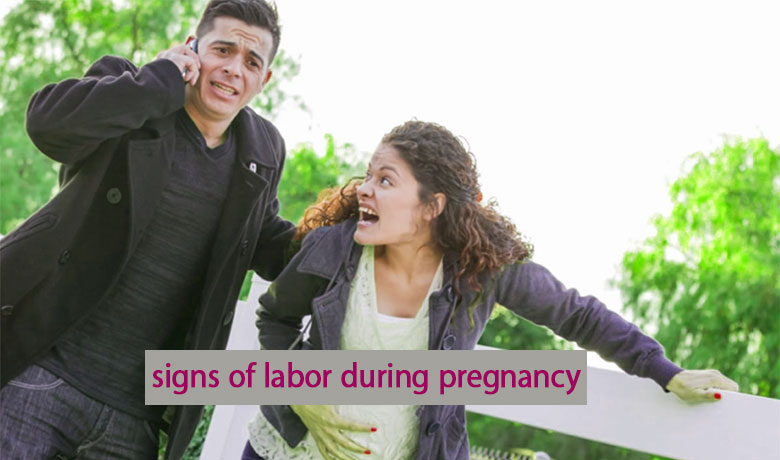signs of labor during pregnancy

During pregnancy, women may experience various changes in their bodies as they prepare for childbirth. One of the most significant changes is the onset of labor, which is the process of delivering the baby. While every woman’s labor and delivery experience is different, there are several signs of labor that women can look out for.
These signs can range from mild to severe and may occur at different times throughout pregnancy. Knowing these signs can help women prepare for labor and delivery and seek medical attention if necessary. In this article, we will explore some of the common signs of labor during pregnancy.
Related posts: Meningitis in Infants
signs of labor during pregnancy
The signs of labor can vary from woman to woman, and it’s important to note that not all women experience every sign. However, some common signs of labor coming are:
- Water breaking: A gush or trickle of amniotic fluid from your vagina, which may be accompanied by contractions.
- Bloody show: A pink or brown discharge from your vagina that may be mixed with mucus.
- Cervical dilation and effacement: Your cervix may start to dilate (open up) and efface (thin out), which can be checked by a healthcare provider.
- Increased vaginal discharge: As your body prepares for birth, you may notice an increase in vaginal discharge.
- Nesting instinct: A sudden burst of energy and desire to clean and organize your home.
There are several signs of labor that you may experience during pregnancy. These include: - Braxton Hicks contractions: These are mild, irregular contractions that may occur throughout pregnancy, but may become more frequent and intense in the weeks leading up to labor.
- Changes in vaginal discharge: You may notice an increase in vaginal discharge, which may become thicker and pinkish in color as your cervix starts to dilate.
- Pressure in the pelvic area: As your baby moves lower into your pelvis, you may feel increased pressure and discomfort in this area.
- Back pain: Some women experience lower back pain or aching as a sign of impending labor.
- Diarrhea: Some women experience loose stools or diarrhea in the days leading up to labor, as the body prepares for birth.
- Nesting: A sudden burst of energy and desire to prepare for the baby’s arrival, such as cleaning, organizing, or cooking.
- Loss of mucus plug: As the cervix starts to soften and dilate, you may notice a thick mucus discharge or “bloody show” as the mucus plug that sealed the cervix comes out.

It’s important to discuss any concerns or questions you have about labor and delivery with your healthcare provider. They can provide you with personalized information and advice based on your individual situation.
Is an increase in blood pressure a sign of labor during pregnancy?
An increase in blood pressure is not necessarily a sign of labor during pregnancy. It may be a sign of preeclampsia, a serious pregnancy complication that requires medical attention. However, some women may experience a sudden drop in blood pressure right before labor begins. It’s important to discuss any concerns about blood pressure changes with your healthcare provider.
Related posts: Loose skin after pregnancy
Can nausea and vomiting be a sign of labor during pregnancy?
Nausea and vomiting are not typically considered signs of labor during pregnancy, as they can be common throughout pregnancy. However, if you experience sudden and persistent vomiting or other symptoms, such as abdominal pain or fever, it’s important to contact your healthcare provider.
Is fatigue a sign of labor during pregnancy?
Fatigue is a common symptom throughout pregnancy, but it is not typically considered a sign of labor. However, some women may experience a burst of energy right before labor begins, known as the “nesting instinct.”
Can a change in bowel movements be a sign of labor during pregnancy?
Yes, a change in bowel movements can be a sign of labor during pregnancy. Some women experience loose stools or diarrhea in the days leading up to labor, as the body prepares for birth.
Is increased vaginal discharge always a sign of labor during pregnancy?
Answer: Increased vaginal discharge is a common symptom throughout pregnancy, but it can be a sign of labor as the cervix begins to soften and dilate. However, not all women experience this symptom before labor begins, and it’s important to discuss any concerns with your healthcare provider.
conclusion
In conclusion, there are several signs of labor during pregnancy that women may experience. These include contractions, changes in vaginal discharge, pressure in the pelvic area, back pain, diarrhea, nesting, and loss of the mucus plug.
It’s important to remember that not all women will experience every sign and that some women may not experience any signs at all until labor begins.
If you have any concerns or questions about labor and delivery, be sure to discuss them with your healthcare provider. Knowing the signs of labor can help women prepare for the birth of their baby and seek medical attention if necessary.
